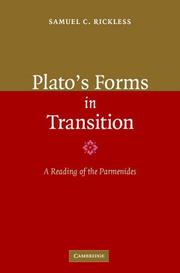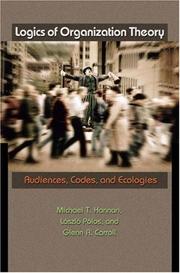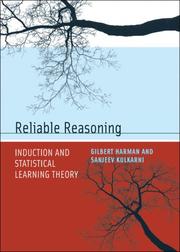| Listing 1 - 10 of 13 | << page >> |
Sort by
|

ISBN: 9781904987161 Year: 2007 Publisher: London : College Publications,
Abstract | Keywords | Export | Availability | Bookmark
 Loading...
Loading...Choose an application
- Reference Manager
- EndNote
- RefWorks (Direct export to RefWorks)
Erreurs logiques. --- Raisonnement. --- Fallacies (Logic) --- Reasoning.
Book
ISBN: 9780916475307 9780916475291 0916475298 0916475301 Year: 2007 Publisher: Newport News : Vale Press,
Abstract | Keywords | Export | Availability | Bookmark
 Loading...
Loading...Choose an application
- Reference Manager
- EndNote
- RefWorks (Direct export to RefWorks)
Raisonnement. --- Erreurs logiques. --- Logic. --- Reasoning. --- Dialectic. --- Fallacies (Logic) --- Argumentation. --- Logique. --- Logique aléthique. --- Raisonnement --- Logique aléthique.
Book
ISBN: 9782804155421 2804155420 Year: 2007 Volume: *13 *40 Publisher: Bruxelles De Boeck
Abstract | Keywords | Export | Availability | Bookmark
 Loading...
Loading...Choose an application
- Reference Manager
- EndNote
- RefWorks (Direct export to RefWorks)
Logic --- Psychology --- Reasoning (Psychology) --- Neurosciences --- Raisonnement (Psychologie) --- Animals. --- Adolescent --- Cerveau --- Comportement animal --- Enfant --- Neuroimagerie fonctionnelle --- Phylogenèse --- Psychologie sociale --- Raisonnement --- Animals --- Différence interculturelle --- Mesure --- Processus cognitif --- Aspect psychologique.

ISBN: 9780521603065 0521842085 0521603064 9780521842082 9780511806544 0511278462 9780511278464 9780511279065 051127906X 051180654X 1107163234 1280850299 0511277288 0511320728 0511277873 Year: 2007 Publisher: Cambridge Cambridge University Press
Abstract | Keywords | Export | Availability | Bookmark
 Loading...
Loading...Choose an application
- Reference Manager
- EndNote
- RefWorks (Direct export to RefWorks)
Fallacies and Argument Appraisal presents an introduction to the nature, identification, and causes of fallacious reasoning, along with key questions for evaluation. Drawing from the latest work on fallacies as well as some of the standard ideas that have remained relevant since Aristotle, Christopher Tindale investigates central cases of major fallacies in order to understand what has gone wrong and how this has occurred. Dispensing with the approach that simply assigns labels and brief descriptions of fallacies, Tindale provides fuller treatments that recognize the dialectical and rhetorical contexts in which fallacies arise. This volume analyzes major fallacies through accessible, everyday examples. Critical questions are developed for each fallacy to help the student identify them and provide considered evaluations.
Logic --- Erreurs logiques --- Raisonnement --- Fallacies (Logic) --- Reasoning. --- Fallacies (Logic). --- Erreurs logiques. --- Raisonnement. --- Argumentation --- Ratiocination --- Reason --- Thought and thinking --- Judgment (Logic) --- Errors, Logical --- Sophisms (Logic) --- Sophistry (Logic) --- Reasoning --- Arts and Humanities --- Philosophy

ISBN: 0521864569 9780521864565 9780511482618 9780521110488 0511260814 9780511260810 9780511261381 0511261381 0511259581 9780511259586 0511260253 9780511260254 9786610749379 661074937X 1107169518 1280749377 0511320396 0511482612 0521110483 Year: 2007 Publisher: Cambridge Cambridge university press
Abstract | Keywords | Export | Availability | Bookmark
 Loading...
Loading...Choose an application
- Reference Manager
- EndNote
- RefWorks (Direct export to RefWorks)
There is a mystery at the heart of Plato's Parmenides. In the first part, Parmenides criticizes what is widely regarded as Plato's mature theory of Forms, and in the second, he promises to explain how the Forms can be saved from these criticisms. Ever since the dialogue was written, scholars have struggled to determine how the two parts of the work fit together. Did Plato mean us to abandon, keep or modify the theory of Forms, on the strength of Parmenides' criticisms? Samuel Rickless offers something that has never been done before: a careful reconstruction of every argument in the dialogue. He concludes that Plato's main aim was to argue that the theory of Forms should be modified by allowing that forms can have contrary properties. To grasp this is to solve the mystery of the Parmenides and understand its crucial role in Plato's philosophical development.
Form (Philosophy) --- Reasoning. --- Forme (Philosophie) --- Raisonnement --- Plato. --- Reasoning --- Argumentation --- Ratiocination --- Reason --- Thought and thinking --- Judgment (Logic) --- Logic --- Idealism --- Matter --- Metaphysics --- Structuralism --- Arts and Humanities --- Philosophy --- Plato. - Parmenides.

ISBN: 9780691131061 0691131066 9780691134505 Year: 2007 Publisher: Princeton, N.J. Princeton University Press
Abstract | Keywords | Export | Availability | Bookmark
 Loading...
Loading...Choose an application
- Reference Manager
- EndNote
- RefWorks (Direct export to RefWorks)
Building theories of organizations is challenging: theories are partial and "folk" categories are fuzzy. The commonly used tools--first-order logic and its foundational set theory--are ill-suited for handling these complications. Here, three leading authorities rethink organization theory. 'Logics of Organization Theory' sets forth and applies a new language for theory building based on a nonmonotonic logic and fuzzy set theory. In doing so, not only does it mark a major advance in organizational theory, but it also draws lessons for theory building elsewhere in the social sciences. Organizational research typically analyzes organizations in categories such as "bank," "hospital," or "university." These categories have been treated as crisp analytical constructs designed by researchers. But sociologists increasingly view categories as constructed by audiences. This book builds on cognitive psychology and anthropology to develop an audience-based theory of organizational categories. It applies this framework and the new language of theory building to organizational ecology. It reconstructs and integrates four central theory fragments, and in so doing reveals unexpected connections and new insights.
Categories (Philosophy). --- Nonmonotonic reasoning. --- Organizational sociology --- Methodology. --- Organization theory --- Categories (Philosophy) --- Sociologie des organisations --- Raisonnement non-monotone --- Catégories (Philosophie) --- Méthodologie

ISBN: 9782296045231 2296045235 Year: 2007 Publisher: Paris : L'Harmattan,
Abstract | Keywords | Export | Availability | Bookmark
 Loading...
Loading...Choose an application
- Reference Manager
- EndNote
- RefWorks (Direct export to RefWorks)
Social sciences --- Subjectivity --- Sciences sociales --- Subjectivité --- Research --- Recherche --- Subjectivité --- Sciences humaines --- Sciences et sciences humaines --- Sciences --- Sciences de l'information --- Logique --- Raisonnement --- Sémantique --- Sémiotique --- Sciences sociales et humaines --- Méthodologie
Dissertation
Abstract | Keywords | Export | Availability | Bookmark
 Loading...
Loading...Choose an application
- Reference Manager
- EndNote
- RefWorks (Direct export to RefWorks)
Notre hypothèse consiste à voir l'impact des activités exercées avant la retraite sur le déclin du fonctionnement cognitif dans le vieillissement. Les deux autres hypothèses sont l'impact du changement d'activités au passage à la retraite et l'impact des activités actuelles sur le fonctionnement cognitif. Notre échantillon est composé de 40 sujets âgés de 57 à 68 ans à la retraite depuis environ 3 ans. Deux séances ont été administrées : la première comportait différents questionnaires sur les loisirs, la santé et les revenus du ménage actuellement et durant les deux dernières années de l'activité professionnelle; la seconde comportait des tests neuropsychologiques évaluant 4 domaines (mémoire, attention, fonctions exécutives et raisonnement non verbal). Au niveau des statistiques, nous avons réalisé des U de Mann Whitney pour des comparaisons de groupes et des régressions multivariées. Nos résultats n'ont pas montré de nombreuses différences significatives lors de nos comparaisons de groupes. Cependant, grâce aux régressions, nous avons constaté que l'âge contribue au déclin cognitif et joue globalement un rôle plus important que le style de vie, exception faite des fonctions attentionnelles.
Loisir --- Activité socio-culturelle --- Mesure --- Vieillissement --- Mémoire épisodique --- Personne âgée --- Fonctions exécutives --- Retraite --- Processus cognitif --- Raisonnement --- Qualité de vie --- Vie quotidienne --- Conditions de vie --- Attention --- Mémoire de travail --- Mémoire à long terme --- Mémoire à court terme --- Loisir --- Activité socio-culturelle --- Mesure --- Vieillissement --- Mémoire épisodique --- Personne âgée --- Fonctions exécutives --- Retraite --- Processus cognitif --- Raisonnement --- Qualité de vie --- Vie quotidienne --- Conditions de vie --- Attention --- Mémoire de travail --- Mémoire à long terme --- Mémoire à court terme

ISBN: 9780262083607 0262083604 0262517345 9786612098505 0262274973 1282098500 1429465611 9780262274975 9781282098503 9781429465618 Year: 2007 Volume: 2007 Publisher: Cambridge, Mass. MIT
Abstract | Keywords | Export | Availability | Bookmark
 Loading...
Loading...Choose an application
- Reference Manager
- EndNote
- RefWorks (Direct export to RefWorks)
The implications for philosophy and cognitive science of developments in statistical learning theory.
Philosophy of science --- Reasoning --- Reliability --- Induction (Logic) --- Computational learning theory --- Raisonnement --- Fidélité --- Induction (Logique) --- Apprentissage informatique, Théorie de l' --- Théorie de l'apprentissage informatique --- Fidélité --- Théorie de l'apprentissage informatique --- Reasoning. --- Reliability. --- Computational learning theory. --- COGNITIVE SCIENCES/General --- PHILOSOPHY/General --- Machine learning --- Inductive logic --- Logic, Inductive --- Logic --- Dependability --- Trustworthiness --- Conduct of life --- Argumentation --- Ratiocination --- Reason --- Thought and thinking --- Judgment (Logic)
Book
ISBN: 9782804155377 2804155374 Year: 2007 Volume: *7 *35 Publisher: Louvain-la-Neuve : De Boeck université,
Abstract | Keywords | Export | Availability | Bookmark
 Loading...
Loading...Choose an application
- Reference Manager
- EndNote
- RefWorks (Direct export to RefWorks)
Cognition in children --- Cognitive learning --- Child development --- Cognition chez l'enfant --- Apprentissage cognitif --- Enfants --- Développement --- Développement --- Child development. --- Cognition --- Enfant --- Nourrisson --- Langage --- Conceptualisation --- Concept --- Reconnaissance des objets --- Orthographe --- Mémoire --- Acquisition du nombre --- Lecture --- Raisonnement --- Résolution de problèmes --- Fonctions exécutives --- Facteur socio-culturel --- Modèle théorique --- développement --- formation --- Constructivisme (psychologie) --- Cognition in children. --- Constructivism (Psychology) --- Chez l'enfant.
| Listing 1 - 10 of 13 | << page >> |
Sort by
|

 Search
Search Feedback
Feedback About UniCat
About UniCat  Help
Help News
News